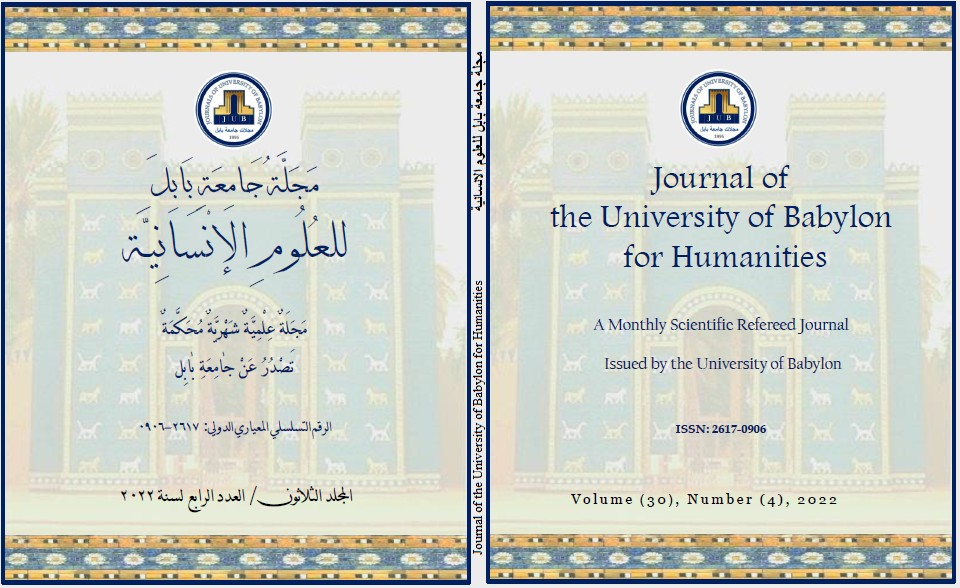Abstract
The contract is the most important type of legal action, which is based on the concurrence of two wills linked by mutual consent to have a legal effect. Once concluded, this contract proves its binding force that prevents one of the contracting parties from retracting it or amending it at his own will. With the concept of violation, the two contracting parties may withdraw from the contract by mutual consent under the dismissal; Which the Iraqi legislator stated in Article (183) of the Civil Code that it is an annulment against the contracting parties and a new contract against others, which raises the problem of annulment in determining the legal nature of the dismissal, as the termination of the contract is a penalty due to one of the contracting parties breaching his obligations, while the dismissal is an agreement. Between the two contracting parties to retract the contract without stipulating the breach of one of the contracting parties, and dismissal with this description is a contract based on the consent of the two parties, so it is necessary to clarify the legislator’s intention to include annulment in determining the legal nature of the dismissal and the extent to which it is considered a contract between them as well as for others.
Let us conclude from the review of the opinions of jurists and the legal texts regulating dismissal that the legislator’s intention to consider the dismissal as an annulment of the contracting parties, but meant by this in terms of effect without intending equality and unity between them in terms of truth and subjectivity of the great discrepancy between them, so that the nature of the dismissal between the two contracting parties becomes clear that it is a contract based on the mutual consent of both parties. affirmatively and accepted.
Let us conclude from the review of the opinions of jurists and the legal texts regulating dismissal that the legislator’s intention to consider the dismissal as an annulment of the contracting parties, but meant by this in terms of effect without intending equality and unity between them in terms of truth and subjectivity of the great discrepancy between them, so that the nature of the dismissal between the two contracting parties becomes clear that it is a contract based on the mutual consent of both parties. affirmatively and accepted.
Keywords
Breach of obligation
Consensual. 5- Back to contract
Contract
Termination Of Contract
Abstract
يعد العقد من أهم أنواع التصرفات القانونية والذي يقوم على توافق إرادتين ترتبطان بالتراضي على إحداث أثرٍ قانوني، وتثبت لهذا العقد بمجرد إبرامه قوته الملزمة التي تمنع أحد العاقدين من الرجوع عنه أو تعديله بإرادته المنفردة، وبمفهوم المخالفة يجوز للعاقدين أن يرجعا عن العقد بالتراضي بينهما بموجب الإقالة؛ التي صرَّح المشرع العراقي في المادة (183) من القانون المدني بأنها فسخ بحق العاقدين وعقد جديد بحق الغير، الأمر الذي يثير اشكالية الفسخ في معرض تحديد الطبيعة القانونية للإقالة، إذ أن فسخ العقد جزاء بسبب إخلال أحد المتعاقدين بتنفيذ التزاماته، في حين أن الإقالة اتفاق بين العاقدين في الرجوع عن العقد من دون اشتراط إخلال أحد العاقدين، والإقالة بهذا الوصف تعد عقداً قائماً على تراضي الطرفين، لذا لا بدَّ من استجلاء قصد المشرع من إيراد الفسخ في تحديده للطبيعة القانونية للإقالة ومدى اعتبارها عقداً بينهما وكذا بالنسبة للغير.
لنخلص من استعراض آراء الفقهاء والنصوص القانونية الناظمة للإقالة من أن قصد المشرع من اعتبار الإقالة فسخاً بحق العاقدين إنما عنى بذلك من حيث الأثر دون أن يقصد المساواة والوحدة بينهما من حيث الحقيقة والذاتية للتباين الكبير بينهما، لتتضح طبيعة الإقالة بين العاقدين بأنها عقد قائم على تراضي طرفيه بإيجاب وقبول.
لنخلص من استعراض آراء الفقهاء والنصوص القانونية الناظمة للإقالة من أن قصد المشرع من اعتبار الإقالة فسخاً بحق العاقدين إنما عنى بذلك من حيث الأثر دون أن يقصد المساواة والوحدة بينهما من حيث الحقيقة والذاتية للتباين الكبير بينهما، لتتضح طبيعة الإقالة بين العاقدين بأنها عقد قائم على تراضي طرفيه بإيجاب وقبول.
Keywords
العقد، فسخ العقد، الإخلال بالالتزام، التراضي، الرجوع عن العقد.
